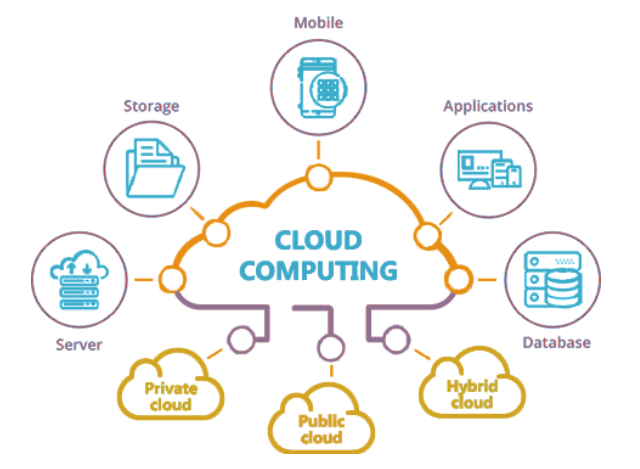
Cloud Services
Welcome to the digital revolution, where the cloud stands tall as the cornerstone of modern computing. In an era defined by rapid technological advancements and evolving business landscapes, embracing cloud services isn’t just an option; it’s a strategic imperative. Whether you’re a small startup or a multinational corporation, leveraging the cloud can propel your organization to unprecedented heights of efficiency, innovation, and scalability.
What are Cloud Services?
At its core, cloud services refer to the delivery of computing resources—such as servers, storage, databases, networking, software, and more—over the internet on a pay-as-you-go basis. Instead of owning and maintaining physical hardware and infrastructure, businesses can access these services remotely from cloud service providers, eliminating the need for costly upfront investments and ongoing maintenance.
How Do Cloud Services Work?
The workings of cloud services revolve around the concept of virtualization and distributed computing. When you subscribe to a cloud service, your data and applications are hosted on remote servers housed in data centers managed by the service provider. These servers are interconnected through vast networks, ensuring high availability and redundancy.
Key Components of Cloud Services:
- Infrastructure as a Service (IaaS): IaaS provides virtualized computing resources over the internet, including servers, storage, and networking infrastructure. With IaaS, businesses have the flexibility to scale resources up or down based on demand, paying only for what they use.
- Platform as a Service (PaaS): PaaS offers a platform for developers to build, deploy, and manage applications without worrying about the underlying infrastructure. It provides tools, libraries, and frameworks to streamline the development process, accelerating time-to-market and reducing development costs.
- Software as a Service (SaaS): SaaS delivers software applications over the internet on a subscription basis. Instead of purchasing and installing software locally, users can access it through a web browser or API, with updates and maintenance handled by the service provider. Common examples include email services, CRM systems, and productivity suites.
Benefits of Cloud Services:
- Cost Efficiency: By shifting from capital expenditure (CapEx) to operational expenditure (OpEx), cloud services enable businesses to reduce upfront costs and pay only for the resources they consume. This pay-as-you-go model promotes cost efficiency and predictability, especially for startups and small businesses with limited budgets.
- Scalability and Flexibility: Cloud services offer unparalleled scalability, allowing businesses to quickly scale resources up or down in response to changing demands. Whether you’re experiencing a sudden spike in website traffic or launching a new product, the cloud provides the flexibility to adapt to fluctuating workloads seamlessly.
- Global Reach: With cloud services, geographical barriers have become a thing of the past. Businesses can access computing resources and reach customers anywhere in the world, thanks to the global infrastructure of cloud service providers. This enables expansion into new markets and facilitates collaboration among distributed teams.
- Enhanced Security: Contrary to common misconceptions, cloud services often offer advanced security features and compliance certifications, surpassing what many organizations can achieve with on-premises infrastructure. From encryption and identity management to threat detection and incident response, cloud providers invest heavily in safeguarding data and infrastructure against cyber threats.
- Innovation Acceleration: By offloading the burden of infrastructure management, cloud services empower businesses to focus on innovation and value creation. With access to cutting-edge technologies such as artificial intelligence, machine learning, and big data analytics, organizations can drive digital transformation initiatives and stay ahead of the competition.
Why Cloud Services are Important?
In today’s digital economy, where agility, scalability, and innovation reign supreme, cloud services have emerged as a game-changer for businesses across industries. Here’s why they are indispensable:
- Agility: In a fast-paced business environment, agility is the key to survival. Cloud services enable businesses to rapidly deploy new applications, experiment with emerging technologies, and respond swiftly to market changes. This agility is essential for staying competitive and meeting customer demands in real time.
- Globalization: The interconnected nature of the cloud transcends borders, enabling businesses to operate on a global scale with ease. Whether you’re a small e-commerce startup or a multinational corporation, the cloud provides the infrastructure and tools to reach customers worldwide, breaking down geographical barriers and unlocking new growth opportunities.
- Disaster Recovery and Business Continuity: Traditional disaster recovery methods, such as backup tapes and offsite storage, pale in comparison to the resilience offered by cloud services. By replicating data across multiple geographic regions and providing automated failover mechanisms, cloud providers ensure business continuity in the face of unforeseen disasters or disruptions.
- Competitive Edge: In today’s hyper-competitive market, innovation is the ultimate differentiator. Cloud services provide access to a rich ecosystem of tools, technologies, and expertise, empowering businesses to innovate at scale and differentiate themselves from rivals. Whether it’s leveraging artificial intelligence to personalize customer experiences or harnessing big data analytics to uncover actionable insights, the cloud opens doors to endless possibilities.
- Sustainability: Beyond its economic and technological benefits, the cloud also plays a vital role in promoting environmental sustainability. By consolidating computing resources in energy-efficient data centers and optimizing resource utilization, cloud providers minimize carbon emissions and reduce the environmental impact of IT operations. For businesses committed to corporate social responsibility, embracing cloud services is a step towards a greener future.
Conclusion:
As we journey deeper into the digital age, the significance of cloud services cannot be overstated. From enabling agility and innovation to fostering global connectivity and sustainability, the cloud has become the bedrock of modern business operations. By embracing cloud services, organizations can unlock new levels of efficiency, scalability, and resilience, positioning themselves for success in an ever-evolving landscape. So why wait? Join the cloud revolution today and unleash the full potential of your business.